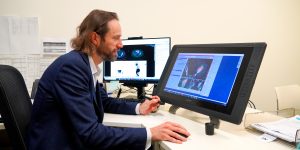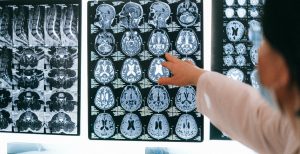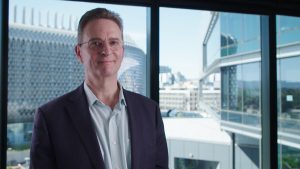Becoming the first person in the world to participate in an international clinical cancer trial is no small feat.
On 29 January 2025 Mr Iliano Puccini became one such person, when persistent solid cancer tumours led his oncologist to recommend him as study patient number one.
In a world-first clinical trial being held at the Royal Adelaide Hospital (RAH) along with other hospitals across Australia and the US, the international study will examine whether the use of a device called a hemopurifier can improve the body’s own natural ability to attack tumour cells.
The principal investigator of the study and Director of the RAH Cancer Clinical Trials Unit is Professor Michael Brown.
“This important study will allow us to examine whether the use of this new device can help restore the ability of a patient’s immune system to fight off these cancer cells,” says Professor Brown.
Currently, less than 40 percent of patients who use medications pembrolizumab or nivolumab to activate their immune system to fight solid tumour cancer have lasting clinical responses to those medications.
After four years of treatment, 75-year-old Iliano’s immune system was needing support. Following a course of radiation in August 2024, some of the tumours continued to grow. That’s why on 11 November 2024 his oncologist Dr Tan suggested the study when looking for additional treatment.
Iliano’s decision to say yes to participating in the study was reinforced by a positive outlook and an equally positive experience with the RAH’s oncology unit. Despite the immunotherapy leading to some wasting of muscle over the past four years, he said he was willing to put up with it because the study might better his life and those of others.
“The only attitude to have is that every day is a good day. There is always someone worse off than me!” Iliano says.
Joining the study
The Aethlon Hemopurifier in Solid Tumors study has patients use a dialysis-like device to have their blood filtered outside of their body to remove tiny particles called exosomes that may be involved in allowing cancer cells to grow and replicate. The Aethlon Hemopurifier is attached to the patient via a catheter placed in a large vein which is connected to a pump that circulates the blood into the haemofilter device to remove the exosomes. The filtered blood is returned to the body over the course of four hours.
Laboratory experiments indicate the Aethlon Hemopurifier can reduce the number of exosomes in plasma by 92-99 percent. The clinical trial will examine how research lab results are reproduced in patients and provide the findings needed to inform the design of a subsequent efficacy and safety study.
Patients who are interested in this study can ask their treating oncologist whether they might be suitable to take part.
About the researcher
Professor Michael Brown is the principal investigator of the study and Director of the RAH Cancer Clinical Trials Unit. He is a specialist physician in clinical immunology and in medical oncology, a pathologist in laboratory immunology, and has research training in gene therapy and cancer immunotherapy.
Professor Brown is also Head of the Translational Oncology Laboratory at the Centre for Cancer Biology and Professor of Medical Oncology at The University of Adelaide.
Lead image shows Nurse Jing with Mr Iliano Puccini, along with oncology registrar Abbey and Professor Brown in the dialysis unit at the RAH.



